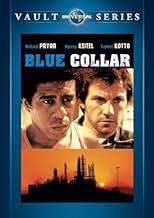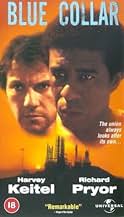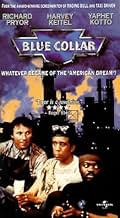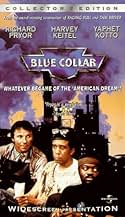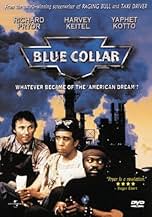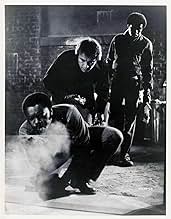CALIFICACIÓN DE IMDb
7.5/10
12 k
TU CALIFICACIÓN
Cuando tres trabajadores intentan robar al sindicato local, en su lugar descubren la corrupción y deciden usar esta información para chantajear.Cuando tres trabajadores intentan robar al sindicato local, en su lugar descubren la corrupción y deciden usar esta información para chantajear.Cuando tres trabajadores intentan robar al sindicato local, en su lugar descubren la corrupción y deciden usar esta información para chantajear.
- Dirección
- Guionistas
- Elenco
- Premios
- 1 premio ganado y 2 nominaciones en total
- Dirección
- Guionistas
- Todo el elenco y el equipo
- Producción, taquilla y más en IMDbPro
Opiniones destacadas
I had to admit something to myself after watching Blue Collar; that I have preconceptions about any movie starring Richard Pryor. Pryor made so many silly comedies like "Stir Crazy" and "Moving" I tend to want to dismiss or label every movie in which he appeared...bad move. Blue Collar is a highly entertaining film that works on several levels. Most of all it scores as a raw, gritty, muckraking type of film exposing the corruption of labor unions and corporate America. Secondly, it works pretty well on a comedic level, but its funny because it's real. The acting here is top notch and Pryor really stands out, and as good as Harvey Keitel is as an actor, Pryor matches him step for step.
Zeke, Jerry and Smokey (Pryor, Keitel and Yaphet Kotto) are three buddies working for the Auto union at Checker Automotive. (a real car maker that allowed the movie to be filmed at their plant, after the big three rejected it) By day, they weld, paint and rivet, by night, they drink and party and concoct schemes to get ahead financially. Eventually they stumble upon a ledger that contains proof that their union is corrupt. They decide to blackmail the union bosses and things start to get complicated. At this point, the film starts to take a more serious tone as the union fights back in a way nobody expected. Zeke is the only one of the three the union bosses are very concerned about and soon he is being offered a promotion.
Pryors even-keeled performance is the key to the film. He's tough and unflappable but smart enough to know when to give in to the powers that determine his fate. His decisions aren't necessary the ones you expect out of a Hollywood movie, but they are the ones that would likely be made in real life....and thats part of the tragedy.
Another great aspect of Blue Collar is the bluesy soundtrack by Jack Nitzsche, with guitar work by the legendary Ry Cooder and the title track performed by Captain Beefheart. The establishing scenes over the opening credits are highlighted by the blues soundtrack with actual punch press sounds incorporated into the music. Its really unique... and a special nod needs given to director Paul Shrader, who handles the films change in tone nicely, and gives the film a tightness and realism that keeps our attention focused throughout.
The movie Blue Collar, viewed today, is like a living time capsule from the 1970s. Lynyrd Skynyrd on the Jukebox, "Good Times" on the TV and Strohs Beer being served at the local Bar. Blue Collar will have a special significance for those who (like me) are from the Midwest...the rust belt. This all seems so familiar, the mindset of these union workers, the us against them mentality...feeling defeated by the system...too far in debt to go a different route in life.
Some of the characters here remind me of the fathers of some of the kids I grew up with. It left me contemplating the question -were we better off when the auto unions were stronger or not? 'real wages' haven't gone up in nearly 40 years. We lose more jobs overseas every year. Were the times depicted in Blue Collar actually the "good old days"?...or more like, the last of the good old days?
When Smokey makes his cryptic speech about "the old being pitted against young, black being pitted against white, everything they do is to keep us in our place"...He isn't just talking about the labor unions, I think he is talking about the whole system itself. Scary thought.
Zeke, Jerry and Smokey (Pryor, Keitel and Yaphet Kotto) are three buddies working for the Auto union at Checker Automotive. (a real car maker that allowed the movie to be filmed at their plant, after the big three rejected it) By day, they weld, paint and rivet, by night, they drink and party and concoct schemes to get ahead financially. Eventually they stumble upon a ledger that contains proof that their union is corrupt. They decide to blackmail the union bosses and things start to get complicated. At this point, the film starts to take a more serious tone as the union fights back in a way nobody expected. Zeke is the only one of the three the union bosses are very concerned about and soon he is being offered a promotion.
Pryors even-keeled performance is the key to the film. He's tough and unflappable but smart enough to know when to give in to the powers that determine his fate. His decisions aren't necessary the ones you expect out of a Hollywood movie, but they are the ones that would likely be made in real life....and thats part of the tragedy.
Another great aspect of Blue Collar is the bluesy soundtrack by Jack Nitzsche, with guitar work by the legendary Ry Cooder and the title track performed by Captain Beefheart. The establishing scenes over the opening credits are highlighted by the blues soundtrack with actual punch press sounds incorporated into the music. Its really unique... and a special nod needs given to director Paul Shrader, who handles the films change in tone nicely, and gives the film a tightness and realism that keeps our attention focused throughout.
The movie Blue Collar, viewed today, is like a living time capsule from the 1970s. Lynyrd Skynyrd on the Jukebox, "Good Times" on the TV and Strohs Beer being served at the local Bar. Blue Collar will have a special significance for those who (like me) are from the Midwest...the rust belt. This all seems so familiar, the mindset of these union workers, the us against them mentality...feeling defeated by the system...too far in debt to go a different route in life.
Some of the characters here remind me of the fathers of some of the kids I grew up with. It left me contemplating the question -were we better off when the auto unions were stronger or not? 'real wages' haven't gone up in nearly 40 years. We lose more jobs overseas every year. Were the times depicted in Blue Collar actually the "good old days"?...or more like, the last of the good old days?
When Smokey makes his cryptic speech about "the old being pitted against young, black being pitted against white, everything they do is to keep us in our place"...He isn't just talking about the labor unions, I think he is talking about the whole system itself. Scary thought.
This is a great film. I knew little about it going in, other than it was supposed to be a very well done, searing drama (this according to several film books, including Leonard Maltin's yearly tomes). I was not disappointed. Paul Schrader - writer of "Taxi Driver," "Raging Bull," and writer/director of "Affliction" - delivers yet another gritty, working-class drama. But the film is not without liberal doses of humor, provided chiefly by Richard Pryor in what I consider to be the best performance of his career. C'mon, people! How can you go wrong with Pryor, Harvey Keitel, and Yaphet Kotto (answer: you can't). The films hooks you right from the great opening credit sequence and doesn't let go 'til the final freeze-frame. I won't give the twists and turns of the plot away, but the film centers on three desperate Detroit auto workers and their corrupt union. It's very disappointing this film is so overlooked today (it also flopped when released)... the level of acting and direction (this was Schrader's directorial debut) is astonishing. See this movie!
Excellent urban drama depicting the lives of three friends who work at a car plant, and plan revenge on their boss. Pryor is great in the lead role, which is probably his best performance in a movie. Schrader does a fine job in his directorial debut and makes this film a pure enjoyment. Bravo for Keitel and Kotto in their supporting roles. A highly underrated film that deserves much better than it got.
4 out of 5
4 out of 5
7tavm
Richard Pryor, Harvey Keitel, and Yaphet Kotto give compelling performances in the drama Blue Collar
After years of reading about this Paul Schrader drama, I finally watched Blue Collar on Netflix Streaming. It stars Richard Pryor, Harvey Keitel, and Yaphet Kotto as three auto assembly workers who feel let down by their bosses and the union rep they don't trust. While Pryor does have some comic moments, he's allowed to be more serious when the film takes a route that challenges these three friends' loyalty to each other. Keitel and Kotto are also very compelling especially when the story concerns the latter's fate. And the score by Jack Nitzsche and Ry Cooder really pours the blues on. So on that note, I recommend Blue Collar. By the way, having noticed that the movie is produced by Norman Lear's company of T.A.T. Communications, he certainly wasn't above plugging his shows "The Jeffersons" and "Good Times" by putting some long clips in when the characters are watching television!
"Blue Collar" opens with a masterful title sequence which introduces us, quickly and effectively, to the harsh world our characters reside in and to the nature of the conditions in the factory they work in. The opening sequence is set to Jack Nitzsche's "Hard Workin' Man", introducing blues music to us right off the bat, music that not only makes up basically all of the music in this film but can be seen as a motif or even a character in the film.
It's amazing how confident and mature Paul Schrader is as a director at this point. Of course, Schrader had already written the massively acclaimed "Taxi Driver" by 1978, but contrary to what one might expect it's his confident and sure handling of the pace and mood in "Blue Collar" that is truly the highlight of the film, not the screenplay penned by Paul and Leonard Schrader, granted the screenplay is in itself quite terrific. Schrader is already a mature director who understands the rhythm of a film.
Going back to the use of music in this film, it isn't so much the score itself by Jack Nitzsche (which is, don't get me wrong, solid blues) that's impressive, it's Schrader's handling of the music and sound in general in this film that makes it work so well. First off, the choice to go with a blues score is inspired in itself, as the nature of the music so perfectly captures what these characters are going through. In addition, the score is most noticeable during scenes where the film appears to be commenting on the futility of the characters' struggle and the misery of what they're going through. Where many films would use music to 'enhance' big, dramatic scenes, Schrader's "Blue Collar" makes the wise decision to use it during low-key scenes. There are several scenes that don't feature any music at all, these being some of the more important scenes. Note the scene where Smokey gets trapped in the paint room, absolutely no music, just the cold sound of the machinery (expertly mixed, might I add), which is far creepier and more effective than any score could be at that point. Similar use of sound occurs a few minutes before the end when Harvey Keitel's character Jerry is being chased.
The acting here is uniformly superb with Keitel possibly giving his best performance (or at least one of them), and Richard Pryor offering what must be recognized as one of the finest performances of the 70's by anyone. Really, who knew Pryor had this sort of skill when it comes to dramatic acting? Yapphet Koto, a beloved character actor, does a fine job in rounding out the cast for the main three characters. Again, Schrader must be credited for directing his actors so well. It's well-known, of course, that the three leads hated each other and actually broke out in fistfights between takes on occasion. Perhaps that created a sort of demented chemistry between them.
The screenplay by Schrader and Schrader (Paul and Leonard) is a fine, fine piece of writing, sort of the daytime factory-worker version of the crude-yet-poetic "Taxi Driver" screenplay. Oddly enough, it's also the source of the few major flaws in this film, as it can come across as fairly heavy-handed in certain scenes. If there's one thing I'd definitely do differently with this film, it's the final shot, which would have been terrific had this been a comedy.
All in all, a great film in its own right and especially impressive as a directorial debut from Schrader. Very memorable.
9/10
It's amazing how confident and mature Paul Schrader is as a director at this point. Of course, Schrader had already written the massively acclaimed "Taxi Driver" by 1978, but contrary to what one might expect it's his confident and sure handling of the pace and mood in "Blue Collar" that is truly the highlight of the film, not the screenplay penned by Paul and Leonard Schrader, granted the screenplay is in itself quite terrific. Schrader is already a mature director who understands the rhythm of a film.
Going back to the use of music in this film, it isn't so much the score itself by Jack Nitzsche (which is, don't get me wrong, solid blues) that's impressive, it's Schrader's handling of the music and sound in general in this film that makes it work so well. First off, the choice to go with a blues score is inspired in itself, as the nature of the music so perfectly captures what these characters are going through. In addition, the score is most noticeable during scenes where the film appears to be commenting on the futility of the characters' struggle and the misery of what they're going through. Where many films would use music to 'enhance' big, dramatic scenes, Schrader's "Blue Collar" makes the wise decision to use it during low-key scenes. There are several scenes that don't feature any music at all, these being some of the more important scenes. Note the scene where Smokey gets trapped in the paint room, absolutely no music, just the cold sound of the machinery (expertly mixed, might I add), which is far creepier and more effective than any score could be at that point. Similar use of sound occurs a few minutes before the end when Harvey Keitel's character Jerry is being chased.
The acting here is uniformly superb with Keitel possibly giving his best performance (or at least one of them), and Richard Pryor offering what must be recognized as one of the finest performances of the 70's by anyone. Really, who knew Pryor had this sort of skill when it comes to dramatic acting? Yapphet Koto, a beloved character actor, does a fine job in rounding out the cast for the main three characters. Again, Schrader must be credited for directing his actors so well. It's well-known, of course, that the three leads hated each other and actually broke out in fistfights between takes on occasion. Perhaps that created a sort of demented chemistry between them.
The screenplay by Schrader and Schrader (Paul and Leonard) is a fine, fine piece of writing, sort of the daytime factory-worker version of the crude-yet-poetic "Taxi Driver" screenplay. Oddly enough, it's also the source of the few major flaws in this film, as it can come across as fairly heavy-handed in certain scenes. If there's one thing I'd definitely do differently with this film, it's the final shot, which would have been terrific had this been a comedy.
All in all, a great film in its own right and especially impressive as a directorial debut from Schrader. Very memorable.
9/10
¿Sabías que…?
- TriviaIt was a very tense shoot, because Richard Pryor, Yaphet Kotto, and Harvey Keitel argued constantly. There were fights, verbal abuse, walk-offs, and Mexican stand-offs. According to Paul Schrader, Pryor punched Keitel and hit Kotto with a chair during filming.
- ErroresWhenever the actors use air powered tools, the tools just spin in mid-air.
- Citas
[last lines]
Smokey James: [voiceover echoing earlier line] They pit the lifers against the new boy and the young against the old. The black against the white. Everything they do is to keep us in our place.
- ConexionesFeatured in At the Movies: Special Show: At the Cassette Store, Part 3 (1986)
- Bandas sonorasHard Workin Man
Music by Jack Nitzsche
Lyrics by Jack Nitzsche, Ry Cooder and Paul Schrader
Performed by Don Van Vliet (as Captain Beefheart)
Selecciones populares
Inicia sesión para calificar y agrega a la lista de videos para obtener recomendaciones personalizadas
- How long is Blue Collar?Con tecnología de Alexa
Detalles
Taquilla
- Presupuesto
- USD 1,700,000 (estimado)
- Total en EE. UU. y Canadá
- USD 6,521,083
- Total a nivel mundial
- USD 6,521,083
Contribuir a esta página
Sugiere una edición o agrega el contenido que falta

Principales brechas de datos
By what name was Blue Collar (1978) officially released in India in English?
Responda


